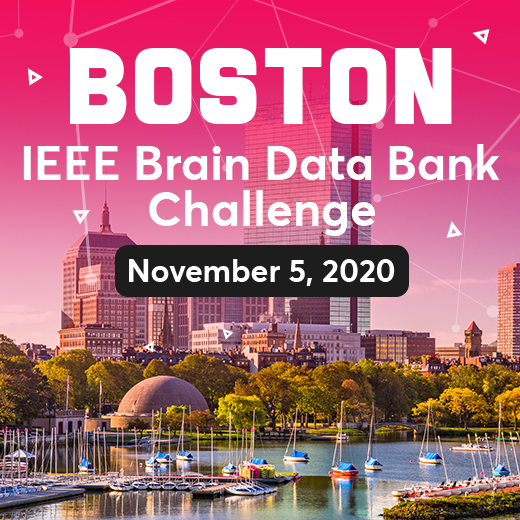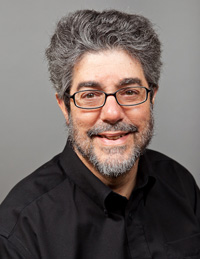IEEE Boston Brain Data Bank Challenge 2020

IEEE Boston Brain Data Bank Challenge 2020
The 2020 Brain Data Bank Challenge (BDBC-2020) is targeted to expose, discuss and accelerate on-going brain research from around the world.
Our program will include an overview of the IEEE Brain initiative, the IEEE Brain Data Bank Challenge, presentations from participants in the challenge, and a keynote presentation by Professor Robert J. K. Jacob of Tufts University.
The Boston session is part of a series of events held with judging locations in Taiwan, Russia, and United States. Some teams from these preliminary rounds will be invited to participate in the final round in Santa Clara, CA, USA.
Others with like interest and curiosity are invited to be in the audience and take advantage of this borderless sharing of state-of-the-art brain research and development.
This meeting will be held virtually. Zoom contact information will be provided to registered attendees.
Purpose
The 2020 Brain Data Bank Challenge (BDBC-2020) invites topics on brain data analytics to improve the quality of life and safety of senior citizens. Knowing the senior population has been severely impacted by COVID-19, this year’s focus will be on the “Aging Brain”.
We seek to address (some or all) questions below, regarding the aging brain:
- How effectively do MRI, EEG, fNIRS, and/or fMRI datasets capture the aging brain?
- How does the aging brain respond to non-verbal signal (e.g., vision, facial expression, body language and temperature)?
- How can emerging techniques, e.g., Big Data Analytics, Artificial Intelligence, and Deep Learning, enhance the prediction of brain aging?
- How to facilitate ease of use, reliability and protection of brain datasets?
Furthermore, lessons learned from past BDBC presentations have led us to believe:
- Using Machine Learning can localize EEG dimensionality with optimized spatial temporal correlation to compress data by 280 fold.
- Using AI/Deep Learning can improve dataset performance and prediction sensitivity to above 90%.
- Low power CNN microchip with nano-sensor can be implanted for real-time prediction.
- 3D model manufacturing can make comprehensive brain display cost-effective.
Registration
We invite you to sign up as a participant (competing and presenting results) or as an observer (in the audience, not competing) to the challenge.
Registration form to enter the IEEE Brain Data Bank Challenge for the IEEE BDB Challenge can be found here.
Registration to attend as a listener for the Boston session - please use the registration button on this form.
Organizers
-
Nan Chu, CWLab International, IEEE Consumer Electronics Society Representative in Brain Initiative and Sensors Council
-
Seth Elkin Frankston, U.S. Army CCDC Soldier Center
-
Bruce Hecht, VG2PLAY
-
Saraju Mohanty, University of North Texas
-
Joseph Wei, Technology Ventures
Date and Time
Location
Hosts
Registration
-
 Add Event to Calendar
Add Event to Calendar
Loading virtual attendance info...
- Contact Event Host
- Co-sponsored by IEEE Boston Sensors Council Chapter, IEEE Boston Solid-State Circuits Society Chapter
Speakers
 Professor Robert J.K. Jacob of Tufts University
Professor Robert J.K. Jacob of Tufts University
Keynote Presentation: Implicit Interaction for Brain-Computer Interfaces
Abstract
Implicit user interfaces obtain information from their users passively, typically in addition to mouse, keyboard, or other explicit inputs. They fit into the emerging trends of physiological computing and affective computing. Our work focuses on using brain input for this purpose, measured through functional near-infrared spectroscopy (fNIRS), as a way of increasing the narrow communication bandwidth between human and computer. Most previous brain-computer interfaces have been designed for people with severe motor disabilities and use explicit signals as the primary input; but these are too slow and inaccurate for wider use. Instead, we use brain measurement to obtain more information about the user and their context directly and without asking additional effort from them. We have obtained good results in a number of systems we created, as measured by objective task performance metrics.
Biography:
Robert Jacob is a Professor of Computer Science at Tufts University, where his research interests are new interaction modes and techniques and user interface software; his current work focuses on implicit brain-computer interfaces. He has been a visiting professor at the University College London Interaction Centre, Universite Paris-Sud, and the MIT Media Laboratory. Before coming to Tufts, he was in the Human-Computer Interaction Lab at the Naval Research Laboratory. He received his Ph.D. from Johns Hopkins University, and he is a member of the editorial board for the journal Human-Computer Interaction and a founding member for ACM Transactions on Computer-Human Interaction. He has served as Vice-President of ACM SIGCHI, Papers Co-Chair of the CHI and UIST conferences, and General Co-Chair of UIST and TEI. He was elected as a member of the ACM CHI Academy in 2007 and as an ACM Fellow in 2016.
Email:
Address:Tufts University, , Medford, Massachusetts, United States
Agenda
5:00PM. Welcome
5:15PM. Introduction & Overview - Brain Data Bank Challenge
5:45PM. Presentations
7:45PM. Wrap-Up
8:00PM. Close

